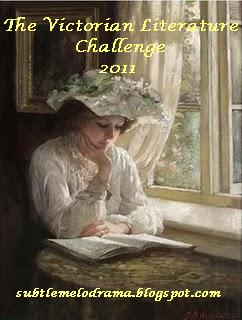2011 Victorian Literature Challenge Wrap Up
 Back in December 2010, I signed up for my first reading challenge on this blog: the Victorian Literature Challenge hosted by Bethany at Subtle Melodrama. I still don’t think I’ve quite grasped the mechanics to participating and linking posts, but I really enjoyed the books that this challenge prompted me to read.
Back in December 2010, I signed up for my first reading challenge on this blog: the Victorian Literature Challenge hosted by Bethany at Subtle Melodrama. I still don’t think I’ve quite grasped the mechanics to participating and linking posts, but I really enjoyed the books that this challenge prompted me to read.
The challenge had four different levels of participation:
Sense and Sensibility: 1-4 books.
Great Expectations: 5-9 books.
Hard Times: 10-14 books.
Desperate Remedies: 15+ books
I said in my initial post that I was aiming for the Hard Times level, with the intention of reading one book each month. In fact, I’ve managed to achieve the dizzy heights of Desperate Remedies, reading a grand total of sixteen Victorian books, including short stories, novels and poetry.
Because of my increasingly enormous review backlog, many of these books are ones that I haven’t written about here yet (although I fully intend to eventually). To give an idea of what I thought about the books I read, the list below is ranked in order of preference and includes the star rating that I gave each book on LibraryThing (5 = I loved it; 4 = I really liked it; 3 = I liked it; 2 = It was ok; 1 = I didn’t like it). All the links are to my reviews, where they exist.
- Cranford by Elizabeth Gaskell (5)
- The Mill on the Floss by George Eliot (4.5)
- Cautionary Tales by Hilaire Belloc (4.5)
- The Yellow Wallpaper by Charlotte Perkins Gilman (4.5)
- Lady Audley’s Secret by Mary Elizabeth Braddon (4)
- Elizabeth and her German Garden by Elizabeth von Arnim (4)
- The Prisoner of Zenda by Anthony Hope (4)
- The Adventures of Sherlock Holmes by Sir Arthur Conan Doyle (4)
- More English Fairy Tales by Joseph Jacobs (4)
- The Warden by Anthony Trollope (3.5)
- The Diary of a Nobody by George and Weedon Grossmith (3)
- Nicholas Nickleby by Charles Dickens (3)
- Wessex Tales by Thomas Hardy (3)
- The Monk and the Hangman’s Daughter by Ambrose Bierce (3)
- The Professor by Charlotte Bronte (2.5)
- Liza of Lambeth by W. Somerset Maugham (2)
As you can see, I really enjoyed most of these books, and all of them proved an interesting reading experience even if I didn’t like them as much. All of the books that I read were by different authors, which was one of my aims when I set out, and as a result I ended up discovering lots of new-to-me Victorian authors which I might not have done without this challenge. Charlotte Perkins Gilman, Mary Elizabeth Braddon, Elizabeth von Arnim, Anthony Hope, Joseph Jacobs, Anthony Trollope and Geroge and Weedon Grossmith were all authors I hadn’t read before, but I already have second books by all of them (except George and Weedon Grossmith who apparently only wrote The Diary of a Nobody).
In addition to discovering some new favourites, I also had fun encountering some familiar faces. I made it through a Thomas Hardy book for the first time ever! While The Wessex Tales did nothing to alter my opinion that Hardy is all doom and gloom, it did prove to me that I can get through it and even enjoy it (albeit in small doses). I think it will still be a while before I attempt Jude the Obscure, but I might perhaps be tempted to try Far from the Madding Crowd in 2012.
Reading Nicholas Nickleby was exactly the experience that I had expected, filled with deserving poor, miserly uncles and charitable rich men. I was disappointed because of the lack of decent female characters and the overall predictability, but I’ve come to the conclusion that I should stop hoping that Dickens will do anything other than what I know he’s going to do and appreciate him for what he does, if that makes any sense at all. There’s a new BBC adaptation of Great Expectations coming this Christmas, so I may reread that book as I know Miss Havisham bucks the trend of insipid women quite spectacularly. Now that I’ve reminded myself that Dickens does exist outside of the classroom, I’m also going to devote a bit more of my reading time to him next year in honour of the Dickens Centenary.
My favourite book by far was Cranford which I had read in part before the challenge. I started reading it shortly after watching the BBC adaptation, but I must have misplaced the book when I moved back home after university and somehow never picked it up again until now. I’m glad I did, because I fell in love instantly with its cast of brave, kind ladies. It’s easily one of my favourite books from 2011.
Although not my favourite book from this challenge by a long way, perhaps the most interesting to read from a critical point of view was The Professor by Charlotte Bronte. I consider Jane Eyre to be one of my favourite books of all time and I really wanted Charlotte Bronte to be like Jane Austen, whose books I find all equally fantastic. However, I was surprised by how indifferent I was towards this particular book. It wasn’t bad (this is, after all, Charlotte Bronte) but it didn’t capture my heart or my mind and I can see why it was only published after the successes of her other novels.
So, all in all, a really good challenge. I’m glad that I participated and thank you once again to Bethany for hosting!